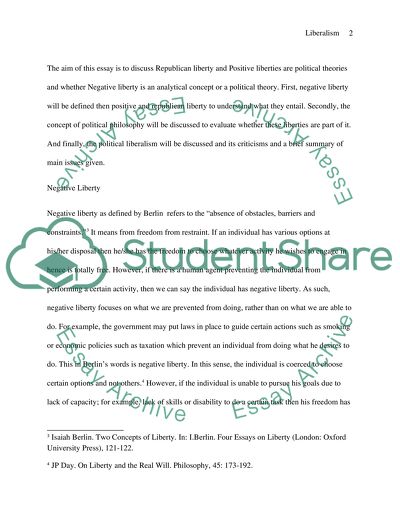Cite this document
(“4. Negative liberty is an analytical concept, not a political theory Essay”, n.d.)
4. Negative liberty is an analytical concept, not a political theory Essay. Retrieved from https://studentshare.org/law/1645088-4-negative-liberty-is-an-analytical-concept-not-a-political-theory-it-tells-us-when-there-has-been-an-infringement-of-liberty-not-whether-that-infringement-is-justifiable-republican-liberty-and-positive-liberty-in-contrast-are-political-theo
4. Negative liberty is an analytical concept, not a political theory Essay. Retrieved from https://studentshare.org/law/1645088-4-negative-liberty-is-an-analytical-concept-not-a-political-theory-it-tells-us-when-there-has-been-an-infringement-of-liberty-not-whether-that-infringement-is-justifiable-republican-liberty-and-positive-liberty-in-contrast-are-political-theo
(4. Negative Liberty Is an Analytical Concept, Not a Political Theory Essay)
4. Negative Liberty Is an Analytical Concept, Not a Political Theory Essay. https://studentshare.org/law/1645088-4-negative-liberty-is-an-analytical-concept-not-a-political-theory-it-tells-us-when-there-has-been-an-infringement-of-liberty-not-whether-that-infringement-is-justifiable-republican-liberty-and-positive-liberty-in-contrast-are-political-theo.
4. Negative Liberty Is an Analytical Concept, Not a Political Theory Essay. https://studentshare.org/law/1645088-4-negative-liberty-is-an-analytical-concept-not-a-political-theory-it-tells-us-when-there-has-been-an-infringement-of-liberty-not-whether-that-infringement-is-justifiable-republican-liberty-and-positive-liberty-in-contrast-are-political-theo.
“4. Negative Liberty Is an Analytical Concept, Not a Political Theory Essay”, n.d. https://studentshare.org/law/1645088-4-negative-liberty-is-an-analytical-concept-not-a-political-theory-it-tells-us-when-there-has-been-an-infringement-of-liberty-not-whether-that-infringement-is-justifiable-republican-liberty-and-positive-liberty-in-contrast-are-political-theo.


